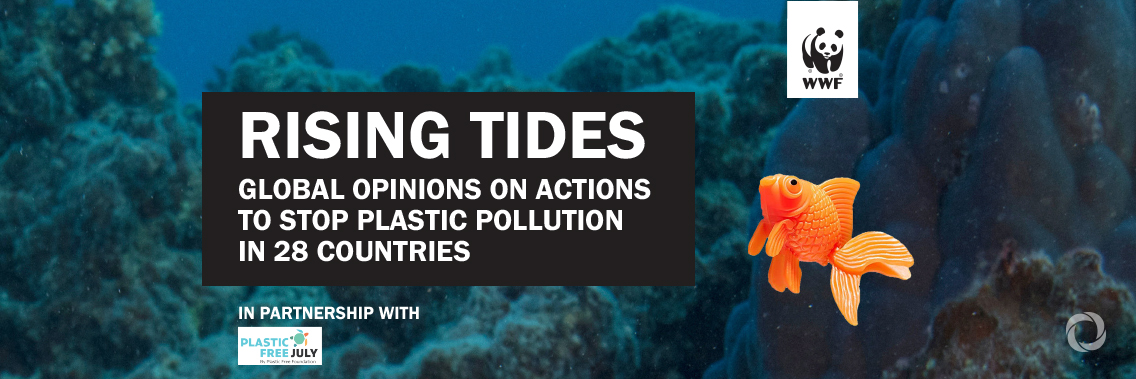An average of nearly nine in 10 people surveyed across 28 countries think it is important to have a global treaty to combat plastic pollution but whether this overwhelming global public support will result in the adoption of an ambitious, legally binding global treaty remains uncertain.
Ipsos polled over 20,000 adults in late 2021 for the Plastic Free Foundation, with WWF partnering to release the results, and this is the first comprehensive global polling on the need for a plastic pollution treaty, which should further strengthen the case for a treaty that sets high global standards for addressing all stages of plastic’s lifecycle and a pathway to ending plastic pollution by 2030.
Latin American countries lead with 93% of the region’s respondents acknowledging the importance of a global plastics treaty, followed by respondents in Europe and the Asia Pacific region. The proportion of people who think a treaty is important was highest in Mexico (96%), China (95%), and Peru (95%).
“We know people are extremely concerned about the growing plastic pollution crisis and in 2021, an estimated 140 million people globally took part in Plastic Free July, but individual action is not enough. There need to be clear and ambitious mandates and targets that reframe our relationship with plastics so that people’s health and that of the environment are not at risk from plastic pollution. The survey is a clear call by people from all corners of the world that they want their governments to act now,” said Rebecca Prince-Ruiz, Founder and Executive Director, Plastic Free Foundation.
❗By 2040, the flow of #PlasticPollution in the ocean will triple 😱
🤝A global #PlasticsTreaty can help fix plastic pollution.
💚An average of 9 out of 10 people think a plastics treaty is important.
🙌🏽RT to show your support!
#AllEyesOnUNEA @PlasticFreeJuly— WWF (@WWF) February 22, 2022
The survey also found that 85% of respondents want manufacturers and retailers to be held responsible for reducing, reusing, and recycling plastic packaging. These demands are in line with a full lifecycle approach to the management of plastic pollution, which Peru and Rwanda have proposed to UN member states to consider ahead of a two-week-long negotiation starting 21 February with a decision to be made 1-2 March at the conclusion of the high-level segment of the UN Environment Assembly.
Following a growing focus on the issue of plastic pollution that started at UNEA in 2014, 156 nations, or ¾ of UN member states, have now publicly expressed support for a global plastics treaty.
Public awareness and concern around the crisis have gained strength as the problem of plastic overconsumption and pollution has grown exponentially: modeling suggests that business-as-usual will result in plastic waste generation doubling and plastic leakage into the ocean tripling by 2040, compared with 2016 levels; 2,144 species of microbes, plants and animals are known to be affected by plastic pollution; and the social, environmental, and economic costs of plastic produced in 2019 alone are estimated to be at least US$3.7 trillion (+/-US$1 trillion) over its estimated lifetime.
Pressure has been mounting on governments for a legally binding treaty to address the plastic pollution crisis. More than 2.2 million people around the world have signed a WWF petition calling for this, while over 120 global companies and more than 1,000 civil society organizations have also backed calls for a treaty.
The survey not only mirrors the overwhelming global public support for a plastics treaty but also highlights the kind of strong and ambitious targets that people would like to see their governments endorse.
“Our plastics crisis threatens to spiral out of control and it is high time for governments around the world to provide leadership. People worldwide have made their views clear. The onus and opportunity are now on governments to adopt a global plastics treaty – one that is legally binding and establishes global rules and regulations that address the full lifecycle of plastic – so we can eliminate plastic pollution in the environment by 2030. We cannot afford anything less,” said Marco Lambertini, Director General, WWF International.

